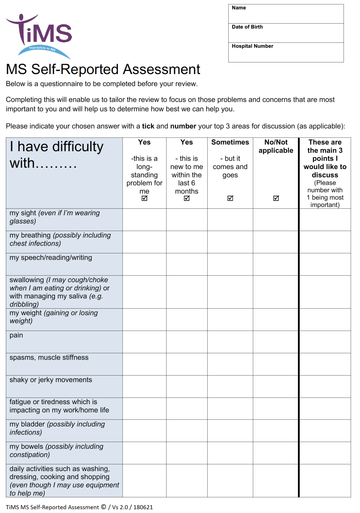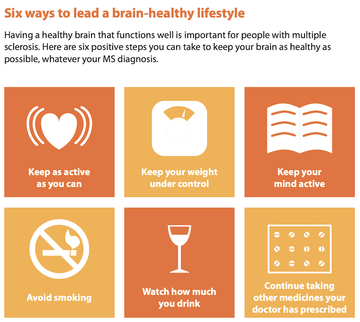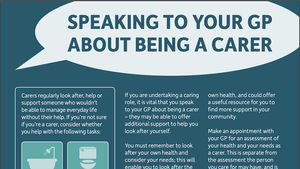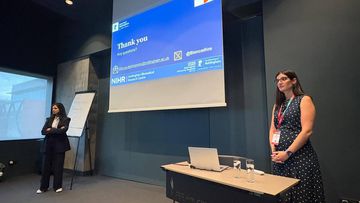Putting policy into practice: Disease-modifying lifestyle
KnowledgeThis is part of a series of practical ideas for how to apply the main changes in the updated NICE Guidance for MS. The previous update examined how we provide support to people in a caring role from the point of diagnosis onwards.
There is a significant shift in focus within the new guidance towards a more holistic view of the patient, with consistent reference to 'a comprehensive review' and an emphasis on using changes to lifestyle in a three-fold way: as a 'disease-modifier', a 'risk reducer,' and a 'symptom manager'.
We will look more closely at symptom management in the next update: this video is focused on an overview of how we can support people with MS to make impactful changes to their lifestyle to protect their brain health, slow their disease progression, and optimise their quality of life with MS for as long as possible.
Our Head of Nursing, Ruth Stross recommends the Therapists in MS (TiMS) self-reported review, which is accessible online as part of a suite of useful tools for healthcare professionals.

Figure 1: the Therapists in MS (TiMS) self-reported review
Modifiable risk factors for relapse or progressive disease such as smoking cessation and exercise are clearly outlined, whilst promoting brain health and maintaining as much brain function as possible, for as long as possible come across more strongly in this new version of the guidance.

Figure 2: taken from MS Brain Health: Time Matters via https://www.msbrainhealth.org
Find the full information and references behind each of the six elements here.
Alongside this whole-person focus is a greater consideration for symptom management such as pain, fatigue and cognition. These symptoms, alongside mood disorders, are usually very unique to the individual, can interrelate, greatly impact quality of life and be challenging to manage effectively.
Often, lifestyle-related changes such as movement and exercise, can be as effective as pharmacological interventions - or even, on occasion, more so. For example, whilst three commonly prescribed drugs for managing fatigue in MS were found to be no better than placebo (Nourbakhsh 2018), a meta-analysis found that physical exercise 'significantly reduces fatigue in patients with MS' (Razazian 2020). This suggests that, for fatigue, lifestyle change may be a superior form of management to pharmaceutical intervention.
However, it is essential that lifestyle changes be made alongside optimised medication, and NICE is clear that a structured medication review be carried out as part of an individuals' comprehensive review. This might require joint working with the GP or pharmacist (NHS England 2020). This involves reviewing all medications that a person is taking, including those for comorbidities. Not only does this ensure that the person with MS is positively impacting their condition in every way possible but it also offers an opportunity to remove medications which may be exacerbating symptoms, or contributing to other problems.
Resources
- A review of studies presented at ECTRIMS 2020 summarising a range of lifestyle and environmental factors which may impact MS. https://neurologyacademy.org/articles/impact-of-the-environment-and-lifestyle-and-ms-risk-and-clinical-course
- A plethora of resources from professional toolkits to patient-facing information is available via msbrainhealth.org
- for people with MS
- Information on how to run a 'disease-modifying clinic' for people with MS, complete with administrative resources like letters and programmes, through to presentations, and resources, are all available here.
- A series of four 'introduction to lifestyle change' handouts for people with MS on nutrition, movement, sleep and mood, developed by a group of healthcare professionals, are available below:
References
Razazian, N., Kazeminia, M., Moayedi, H. et al. The impact of physical exercise on the fatigue symptoms in patients with multiple sclerosis: a systematic review and meta-analysis. BMC Neurol 20, 93 (2020). https://doi.org/10.1186/s12883-020-01654-y
NHS England, Structured medication reviews and medicines optimisation, epub 17 September 2020, accessed https://www.england.nhs.uk/publication/structured-medication-reviews-and-medicines-optimisation/ (19.08.22)
Nourbakhsh B, Revirajan N, Waubant E. Treatment of fatigue with methylphenidate, modafinil and amantadine in multiple sclerosis (TRIUMPHANT-MS): Study design for a pragmatic, randomized, double-blind, crossover clinical trial. Contemp Clin Trials. 2018 Jan; 64:67-76. doi: 10.1016/j.cct.2017.11.005. Epub 2017 Nov 4. PMID: 29113955.


Related articles
Encouraging excellence, developing leaders, inspiring change
MS Academy was established in 2016 and in that time has accomplished a huge amount with exciting feedback demonstrating delegates feel inspired and energised along their personal and service development journeys. The various different levels of specialist MS training we offer are dedicated to case-based learning and practical application of cutting edge research.


